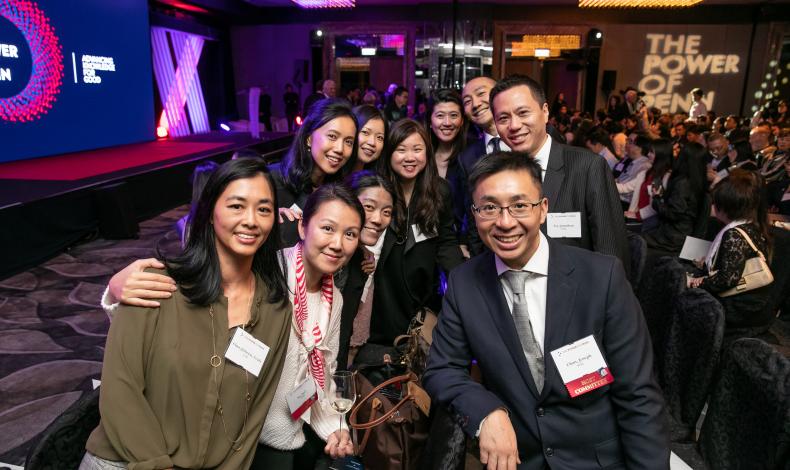Celebrating Penn in China

President Amy Gutmann emphasized the three pillars of her vision for the future of Penn—innovation, inclusion, and impact—while speaking at The Power of Penn Celebration in Hong Kong on March 6.
With over 5,000 international students and over 1,000 faculty conducting research, teaching, and leading projects across all seven continents, Penn is more global than ever before. Within this landscape, Penn’s relationship with China stands out. China is the single largest country represented in the University’s student body after the United States, and Penn’s Chinese alumni network is one of the strongest in the world.
The strength of these connections was represented on March 6 by the robust turnout of more than 400 parents, alumni, and friends at The Power of Penn Celebration in Hong Kong. At the event, Penn Trustee George Hongchoy, WG’91, PAR’18, PAR’21, welcomed guests and spoke about the impact of sharing knowledge across cultures—a theme reiterated throughout the evening in President Amy Gutmann’s remarks, and in the conversation that she led with three Penn faculty members.
Mr. Hongchoy acknowledged fellow Trustees and leadership volunteers in the audience. He also recognized Penn academic leaders in attendance—Fritz Steiner, Paley Professor and Dean of the newly renamed University of Pennsylvania Stuart Weitzman School of Design; Vijay Kumar, Nemirovsky Family Dean of Penn Engineering; M. Grace Calhoun, T. Gibbs Kane, Jr. W’69 Director of Athletics and Recreation; and William Burke-White, Richard Perry Professor and Director of Perry World House, Penn’s home for global engagement on campus.
In her remarks, President Gutmann outlined her vision for the future of Penn and efforts underway to accelerate impact, spark innovation, and grow inclusion. “The Power of Penn Campaign will take us further faster, and propel us forward in bold new ways,” she said. “We are focused on creating opportunities that will grow our students into global citizens whose collective knowledge will benefit the world.”
At the epicenter of the University’s global engagement efforts is Penn’s relationship with China, which began more than two centuries ago. Today, Penn offers more than 12 study abroad opportunities in the country, and nearly 2,000 undergraduate and graduate students who are Chinese citizens are currently enrolled on campus. Beginning with the first official partnership with Shanghai’s Jiao Tong University in 1980, the University now celebrates more than 20 partnerships with Chinese institutions. The Penn Wharton China Center, located in Beijing and established in 2015, provides support for some of the more than 400 faculty research projects and instructional activities taking place in China.
In their conversation with President Gutmann, faculty speakers David Galligan, Winka Dubbeldam, and Karl T. Ulrich shared some of the ways their work is integrally connected to China and the larger world.
Winka Dubbeldam, the Ella Warren Shafer Miller Professor and Chair of Architecture at the Weitzman School and founding partner of the firm Archi-Tectonics in New York, shared her vision for the design proposal that was selected for the 2022 Asian Games in Hangzhou.
“One of the first things we realized about this project is that the Asian Games last for two weeks, while the park will hopefully last forever,” said Dubbeldam. “We decided to propose the park as a green lung for the city of Hangzhou and its inhabitants.”
The plan includes stadiums, a shopping mall, and a park, designed to celebrate local culture and be outstanding examples of energy-efficient green design. The project will be exemplary of the government’s “Sponge City” concept, featuring scenic wetlands for rainwater storage and permeable pavements that prevent excess water runoff.

